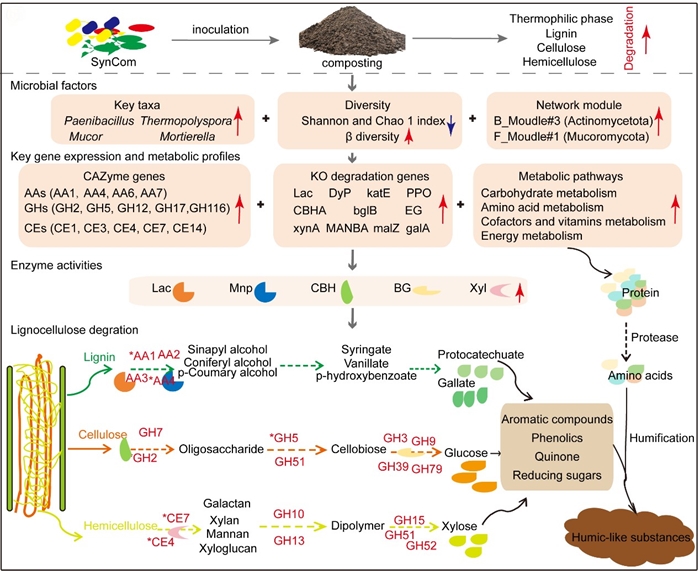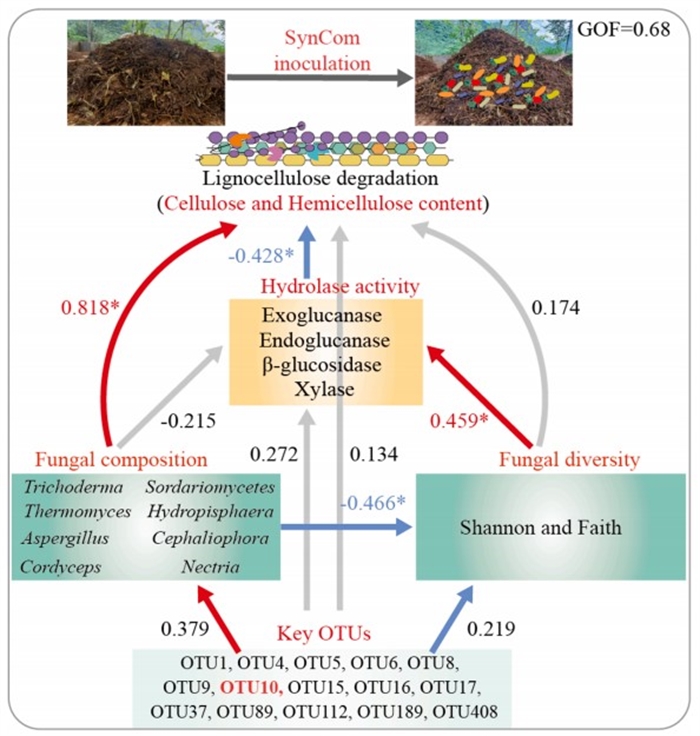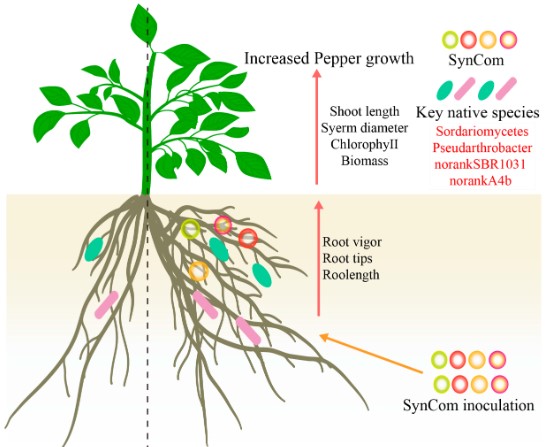Synthetic Microbial Communities Greatly Promote Compost Material Transformation and Crop Growth, New Advance
In their latest three studies, a research team led by Professor Li Dejun from the Institute of Subtropical Agriculture, Chinese Academy of Sciences, has made significant progress in the field of synthetic microbial communities (SynCom) in enhancing lignocellulose degradation, promoting compost material transformation and crop growth.
In modern agriculture, composting serves as an environmentally friendly method for processing agricultural waste, converting organic waste into fertilizers and improving soil quality. The application of SynCom, particularly in the degradation of lignocellulose, has gradually become a key strategy to enhance composting efficiency. At the same time, the health of crops is closely related to the balance of soil microbial communities. SynCom can regulate the rhizosphere microbiota, enhancing nutrient absorption and stress resistance in crops, thus promoting crop growth and disease resistance. Therefore, optimizing the structure and function of microbial communities not only improves compost quality but also promotes crop growth, making it a forefront topic in modern agricultural research.
Firstly, the key mechanisms in synthetic microbial community contribute to lignocellulose degradation during the thermophilic phase of composting were revealed. The SynCom inoculation effectively reduced the content of lignin, cellulose, and hemicellulose, while significantly increasing the activity of key degradation enzymes such as laccase, manganese peroxidase, cellulase, and xylanase. Additionally, metagenomic analysis showed that synthetic microbial communities significantly enhanced microbial metabolic pathways related to carbohydrate metabolism, amino acid metabolism, vitamin metabolism, and energy metabolism, thereby optimizing the structure and function of the microbial community at the gene level during composting.
Moreover, SynCom further enhance compost material transformation by regulating fungal communities. Researchers found that SynCom inoculation increased the relative abundance of key fungal genera such as Cephaliophora and Thermomyces, and significantly increased the activity of functional groups closely related to lignocellulose degradation, including wood-decaying fungi, undefined saprophytic fungi, and leaf litter-decomposing fungi. Furthermore, the significant enrichment of the key species Hydropisphaera (OTU10) was confirmed as an important driver for lignocellulose degradation, significantly improving the quality of organic fertilizer after compost maturity.
Additionally, the team further explored the application of synthetic microbial communities in promoting pepper growth. SynCom inoculation significantly increased the plant height, stem diameter, leaf number, chlorophyll content, and root vitality of pepper plants. High-throughput sequencing results showed that SynCom inoculation significantly increased the richness of rhizosphere microbial communities and the abundance of key genera, especially the relative abundance of Sordariomycetes and Pseudarthrobacter, which were closely correlated with crop growth.
These series of research findings suggest that synthetic microbial community inoculation is an efficient, eco-friendly strategy for agricultural waste treatment and crop yield enhancement, providing new ideas and technical support for sustainable agricultural development. With further research into synthetic microbial communities, their potential in optimizing composting and agricultural production will be increasingly realized, playing a significant role in promoting the development of green agriculture.
Contact:Dejun Li
E-maill:idejun@hotmail.com

Mechanisms of synthetic microbial community inoculation in enhancing lignocellulose degradation during the thermophilic phase of composting (Imaged by Chen Shuangshuang)

Mechanisms of synthetic microbial community inoculation in promoting lignocellulose degradation (Imaged by Liu Qiumei)

Mechanisms of synthetic microbial community inoculation in promoting pepper growth(Imaged by You Tian and Liu Qiumei)
Download attachments: